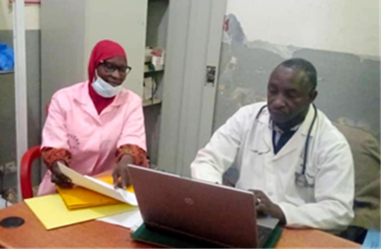From Misfortune to Prevention: Improving Babies’ Health Outcomes in Mali
Published on March 18, 2024
By Anaclet Ngabonzima, Child Health Lead, MOMENTUM Integrated Health Resilience and Demba Traoré, Technical Director, MOMENTUM Integrated Health Resilience, Mali
According to UNICEF, children in sub-Saharan Africa have the highest mortality rates in the world at 74 deaths per 1,000 live births and are 14 times more likely to die before the age of five than those in developed regions. Unfortunately, the situation in Mali is even worse. Although the country’s under-five mortality rate has declined over the last few decades, to 101 per 1,000 live births, this figure remains far too high, and most of these deaths are due to preventable causes.

As Dr. Moulaye Djiteye, the head of the Gyneco-Obstetrics Department at the Hagnadoumbo Moulaye Touré Hospital in Gao, explains, he’s seen pediatric deaths that were “truly shocking.” For example, “One child under oxygen therapy … died for lack of electricity and another … died because his parents had not brought him to the appropriate health facility in time for lack of financial means or for sociocultural beliefs. This shows the limits of our current health care system.”
To help understand and address these challenges, MOMENTUM Integrated Health Resilience collaborated with the Mali Ministry of Health to introduce and adapt the Pediatric Death Audit (PDA) approach to the fragile contexts where the project works. Based on World Health Organization guidelines, PDAs enable health care providers to examine the spectrum of factors that contributed to a preventable death, implement recommendations to address those factors, and hopefully prevent future deaths from the same causes. In the process, health facilities can more readily determine if patient care procedures align with proven best practices and guide health workers on how to improve the quality of care.
Before adopting PDA, health care professionals in Mali began implementing the Maternal and Perinatal Death Surveillance and Response (MPDSR) approach in 2016 to reduce preventable maternal deaths. Now, Mali is looking to expand on this work by focusing simultaneously on PDA to reduce preventable deaths in children under five.
In 2022, MOMENTUM held initial discussions with the Ministry of Health on adopting and pilot-testing PDA. Afterward, the team supported Mali’s National Office of Reproductive Health and other public and private sector stakeholders to adapt the PDA guidelines to the country’s specific needs. Through a national workshop, existing MPDSR documents, guidelines, and data collection tools were then revised to integrate PDA concepts, leading to the establishment of the MPPDSR approach, with the second “P” reflecting the integration of “pediatric” death into MPDSR.
MOMENTUM went on to provide PDA-focused training to MPDSR committees in Gao and Timbuktu. The team also conducted a three-day training in 2023 on continuous quality improvement to ensure proper implementation of the process and that recommendations are translated into actions that improve the quality of care.
“If we want to have a greater impact on reducing maternal, perinatal, and pediatric deaths, it is imperative to monitor the implementation of response plan actions at all levels of the health pyramid. This requires greater coordination of stakeholders … and synergy of interventions,” said Dr. Djiteye.
At the Hagnadoumbo Moulaye Touré Hospital, modifiable factors identified through the death auditing process from July to September 2023 included the need to address delays in decision-making, administering care, and transferring patients from the referral health center to the hospital, along with the challenges arising from not having a neonatal unit. Subsequent recommendations based on these findings include:
- Ensuring all relevant staff are involved in managing obstetric emergencies.
- Equipping the hospital with an incubator/heat lamp.
- Raising awareness through radio messages about the importance of seeking care early at health centers.
- Holding a meeting to discuss ways to address patient transfer delays.
Though still early in the PDA integration process, the results have been promising. Audit committee members appreciate the MPPDSR approach and think that it contributes to an improvement in the quality of care provided to children under five. In fact, due to its potential benefits, PDA has now been adopted in Mali on a national scale.
“With this training, I’ve learned that we can structure our work better by setting up a network of multidisciplinary collaborators and making greater use of national standards,” said Dr. Djiteye. “As a unit manager, the application of [this] knowledge … will bring added value in improving the quality of services and care in order to contribute to the reduction of avoidable deaths.”

